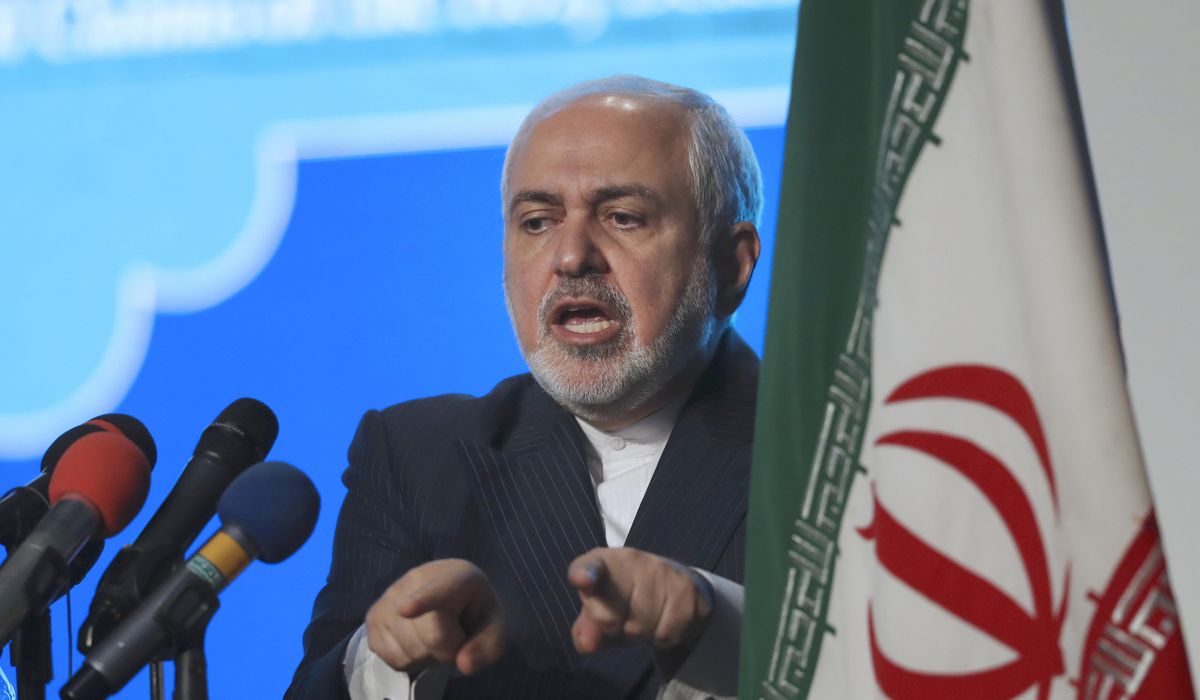
Iranian Foreign Minister Mohammad Javad Zarif sought to win Pope Francis’ support for Tehran’s perspective on the ongoing Israeli-Palestinian violence during a private meeting between the two at the Vatican on Monday.
Iran’s Islamic Republic News Agency, an official outlet of the government in Tehran that critics describe as a propaganda website, reported that Mr. Zarif used the meeting to tell the pope that “Palestinians are in a deplorable situation.”
It was not immediately clear how the presentation was received. Vatican News, an official website of the Vatican, carried no mention of the Iranian foreign minister’s visit on its English-language version Monday.
U.S. officials blame Iran for backing Hamas and other Palestinian groups launching rockets into Israel, while Tehran accuses Israeli forces of deliberately pounding Palestinian civilian targets in Gaza.
Francis has been outspoken in a geopolitically neutral fashion toward the Israeli-Palestinian violence over the past week. On Sunday, the pope called for an end to fighting in Israel and Gaza and stressed that the death of innocent people, particularly children, is “terrible” and “unacceptable.”
“I appeal for calm, and for those responsible to end the clamor of weapons and to take the path of peace,” he said in a weekly address to faithful gathered in Saint Peter’s Square on Sunday, according to Reuters.
“Many innocent people have died, amongst them there are also children. This is terrible. Unacceptable,” the pope said. “Their death is a sign that [people] don’t want to build a future, but destroy it. … I wonder where hatred and revenge will lead?”
The Islamic Republic News Agency, meanwhile, reported that in addition to talking to Francis about Palestinians, Mr. Zarif used his visit to the Vatican to note that “sanctions have “had a terrible impact on the Lebanese people.” The news agency went on to assert that “the Catholic Church is sensitive to the situation in Lebanon.”
The United States has long accused Iran of being a state sponsor of terrorism and of backing the Lebanon-based Hezbollah movement, which the U.S. State Department has designated as a “Foreign Terrorist Organization,” or FTO, since 1997.
Last week, the Biden administration announced sanctions against seven Lebanese nationals over what the U.S. Treasury Department described as links to Hezbollah and its financial operation known as “Al-Qard al-Hassan.”
A Treasury Department press release said the seven have been listed as Specially Designated Global Terrorists (SDGT), and Al-Qard al-Hassan, which was previously designated for sanctions by Treasury’s Office of Foreign Assets Control (OFAC) back in 2007, is presently used by Hezbollah “as a cover to manage the terrorist group’s financial activities and gain access to the international financial system.”
“As a result of today’s action, all property and interests in property of these individuals named above, and of any entities that are owned, directly or indirectly, 50 percent or more by them, individually, or with other blocked persons, that are in the United States or in the possession or control of U.S. persons must be blocked and reported to OFAC,” the press release said.
Hezbollah’s activities in Lebanon are multifaceted and complex. In addition to militancy, the group has emerged as a major factor on the Lebanese political landscape in recent years, creating headaches for Washington, which has used sanctions to try and derail the group’s influence.
In September, the Treasury Department sanctioned two former Lebanese Cabinet ministers whom U.S. officials described as being allied with Hezbollah in what The Associated Press characterized as a “rare move” by Washington against politicians close to Hezbollah, despite the fact that the group has been listed by the State Department as an FTO for more than two decades.
The sanctions appeared to be designed to send a message to politicians in Lebanon and to Hezbollah and its allies who control majority seats in parliament in the Mideast country, which is experiencing its worst economic and financial crisis in decades, that Washington will not tolerate a Hezbollah takeover of the Lebanese government.
